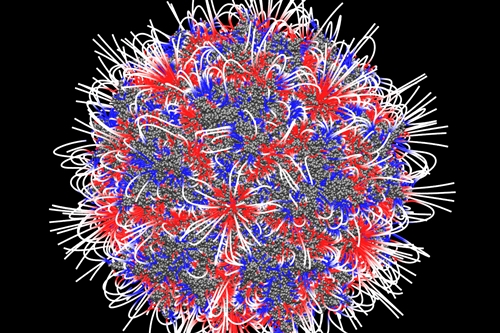20 March 2017. A spin-off enterprise from University of Oxford in the U.K. began enrolling participants in a clinical trial testing gene therapy to correct a genetic eye disease. NightstaRx Ltd in London says the study is the first of its type to test a treatment for X-linked retinitis pigmentosa, a rare disorder that leads to blindness mainly in men.
NightstaRx specializes in therapies for genetic diseases affecting the retina, in this case the breakdown and failure of photoreceptor cells in the retina leading to progressive vision loss. Retinitis pigmentosa takes several forms, but in this type is caused largely by a recessive mutation in the retinitis pigmentosa GTPase regulator or RPGR gene. The mutation causes a breakdown in photoreceptor cells leading to blind spots, night blindness, and tunnel vision, progressing to total blindness. There is so far no cure for retinitis pigmentosa, with most treatments designed to cope with vision loss.
NightstaRx was formed in January 2104 to commercialize the research of Oxford ophthalmologist Robert MacLaren, the company’s scientific founder and current board member. MacLaren’s research is the basis of NightstaRx’s lead product, a gene therapy code-named AAV2-REP1 for choroideremia, another inherited disorder affecting the retina. AAV2-REP1 is now in an early-and intermediate-stage clinical trial.
The company’s treatments for X-linked retinitis pigmentosa, uses a method similar to AAV2-REP1, harnessing adeno-associated viruses to deliver the therapy. Adeno-associated viruses are benign and naturally occurring microbes that can infect cells, but do not integrate with the cell’s genome or cause disease, other than at most mild reactions in humans. NightstaRx says it licensed the rights to the technology being tested in the trial some 18 months ago.
In this case, the treatments contain healthy RPGR genes injected the eyes, with the adeno-associated viruses carrying the genes into the retinal cells. The clinical trial is recruiting 24 men with X-linked retinitis pigmentosa at ophthalmology clinics in Oxford and Manchester. The early- and intermediate-stage study is looking primarily at the safety of the treatments and tolerability in participants over 12 months.
MacLaren, the clinical trial’s lead investigator, says in a company statement that preclinical studies in animals suggest gene therapy can correct defective photoreceptor cells. “Based on previous findings in preclinical in vivo disease models, which have shown significant rescue of photoreceptors,” notes MacLaren, “we believe this approach has great potential to restore or maintain sight in patients.”
More from Science & Enterprise:
- Allergan to Option Gene Editing for Eye Diseases
- DNA Tags Speed Nanoparticle Gene Therapy Discovery
- Regeneron, Children’s National Partner on Rare Diseases
- Gene Therapy Shown Helpful with Inherited Skin Disease
- Gene Silencing Treatments Licensed for Heart Disease
* * *


 RSS - Posts
RSS - Posts
You must be logged in to post a comment.